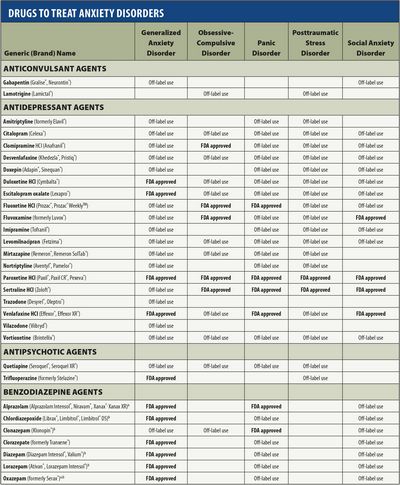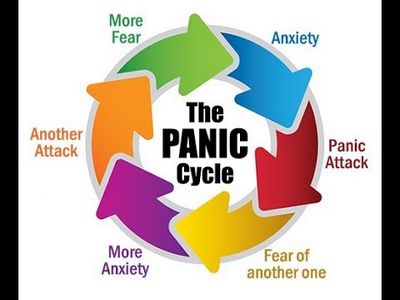Generalized Anxiety Disorder is defined by excessive and persistent worry over a wide variety of matters.

People with GAD can be overly worried about money, health, work, family, friends, or other concerns. A diagnosis of GAD can range from being mildly anxious to highly anxious.
Because GAD is a mental illness, it is a disorder that can be treated successfully. It is treatable with counseling, exercise, diet, medication, therapy, and cognitive behavioral therapy. Although the exact cause of GAD is not known, it is thought that it is caused by a combination of biological and environmental factors. A diagnosis of GAD is typically made when there are three or more of the following symptoms for at least six months: having problems concentrating, losing sleep, having panic attacks, feeling restless or uncomfortable, and having difficulty making decisions.
Treatment of GAD usually begins with medication. One of the most commonly prescribed medications for the treatment of GAD is SSRIs. Other medications that are commonly used to treat GAD include tricyclic antidepressants (TCAs), anti-anxiety medications (including benzodiazepines), and beta blockers. However, in some cases doctors may recommend using psychotherapy in addition to medications.
In psychotherapy, doctors help patients overcome the anxieties and fears that often lead to GAD. These fears include stress over money, work, health and relationships. In some cases, patients will also receive therapy that focuses on improving their understanding of their problems, helping them identify triggers, and dealing with the feelings and emotions associated with them.
Medications can treat the symptoms of GAD as they develop and help treat the disorder. For example, anti-anxiety medications such as benzodiazepines can be used to help patients who experience symptoms of GAD. The use of antidepressants such as Tofranil and Prozac have also helped many patients to overcome the negative thoughts and feelings that often result in GAD.
Cognitive behavioral therapy helps patients recognize and change irrational thoughts and behavior and learn to relax before they occur. This can help individuals recognize their negative thoughts before they begin to build up in their mind and eventually develop into a full blown panic attack. By learning to relax and conquer their anxiety, patients can reduce their risk for developing GAD.
In addition to medications, some patients may need counseling to help them deal with the emotional aspects of their disorder. Inpatient and outpatient treatment options are available for people who need help controlling their stress levels and learn how to cope with stress. Counselors are trained to help patients identify triggers, deal with negative thoughts and emotions and help them learn to control their feelings and emotions.
People who suffer from GAD can live fulfilling lives if they are willing to seek treatment and try to take control of their condition. With a little effort and the support of their doctor and treatment team, people with GAD can learn to manage their anxiety. They can learn to take responsibility for their condition and learn to overcome their fears.
One of the reasons that doctors often recommend that patients take medications, especially anti-anxiety medications, is because they can relieve the symptoms of GAD. Patients who are unable to control their symptoms or manage their anxiety well can end up resorting to dangerous methods, such as self-medication. Self-medication can often lead to serious problems and even death. Physicians often recommend treating GAD with a combination of medications and therapy to provide the best possible results.
Because medication can only treat the symptoms of GAD, some patients may find that the side effects of the medications can be difficult to deal with. Medications can cause some of the same physical symptoms that patients experience during an anxiety attack. Some patients report experiencing insomnia, fatigue, muscle pain, heart palpitations, dizziness, upset stomach and nausea, or even dizziness, nausea, vomiting and difficulty breathing.
Patients can avoid the side effects of medications by avoiding the drugs when possible.

But for some patients, medication may be necessary for dealing with symptoms of GAD.
Many patients, particularly those who are taking anxiety medications, should avoid the medications entirely. There are other ways to overcome symptoms of GAD without the use of medications. Cognitive behavioral therapy combined with medication and therapy can be an effective treatment option for people who do not respond to medication. In most cases, physicians can treat symptoms of GAD with these methods, but in some cases, they may recommend the use of medication.
Weighted blankets are among the many tools that mental health and psychiatry clinics employ for their patients’ use. And today, it’s more easily accessible, beyond a clinical setting, even outside of a psychiatric setting. Many stores carry these blankets. In fact, many people today are looking for ways to supplement their current sleep patterns, and these types of blankets can be an inexpensive and effective means of doing so. In fact, weight loss is one of their biggest benefits.
Weight loss in general is often the result of making some dietary and lifestyle changes, however, this doesn’t necessarily mean you need to lose weight by adding weight to your blanket. In fact, a weighted blanket can actually add to the weight loss process. And there are many different benefits from sleeping on a blanket that includes weights. Below is a short overview of these blanket benefits.
One of the biggest benefits from using a blanket for weight loss is how quickly you will lose weight. By sleeping on a weighted blanket instead of just laying flat, your body gets used to the blanket and begins losing weight much faster. This will allow your metabolism to speed up and burn off more calories than when you are lying down or simply sitting in bed. When you wake up in the morning, you will feel much lighter.
Weighted blankets are also great for helping patients to relax. When you have a stressful day at work, or have an important meeting on time, but you can’t seem to relax, a weighted blanket can help you focus on relaxing. You can simply take a few minutes to read a book or do other activities while you sleep. This can help you de-stress and return to a state of relaxation without having to worry about other things and stress being a part of your day.
Another benefit of using a weighted blanket for weight loss is that it can help you sleep better. When you lay on a blanket, you are less likely to wake up with a stiff neck and sore back from being woken up throughout the night. As mentioned earlier, a weighted blanket can help to increase your metabolism, which helps to get rid of weight and reduce stress. aches and pains. When you are resting, your mind and body tend to go to take longer to recover. from your daily stresses, which can lead to more aches and pains.
So if you are looking for a way to supplement your current diet and exercise routine to aid with your weight loss efforts, consider using a weighted blanket to help get the most out of your workout. It can help to get rid of stress and aches and provide you with a higher quality of sleep.